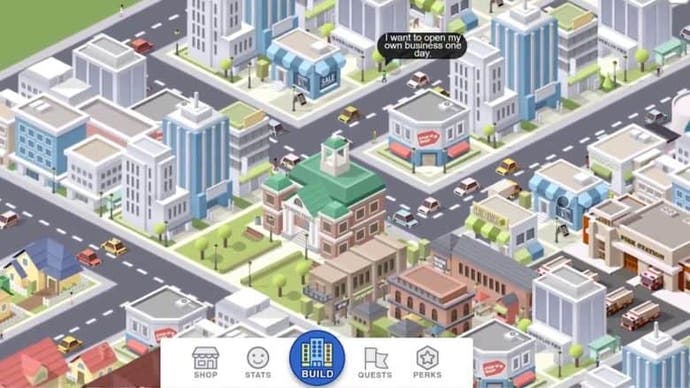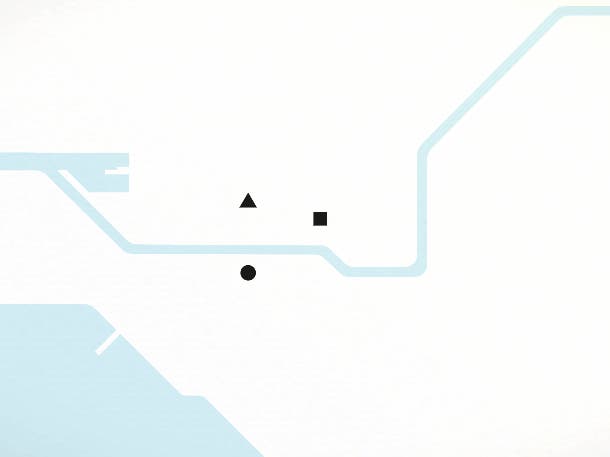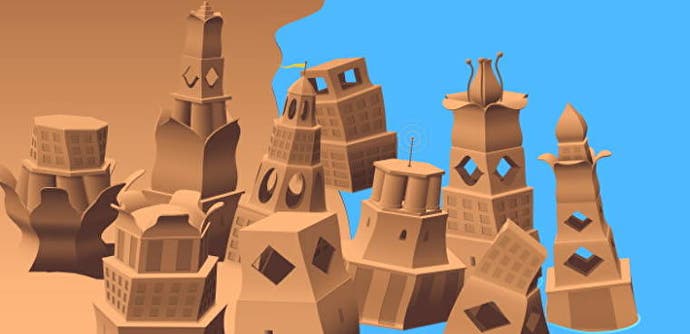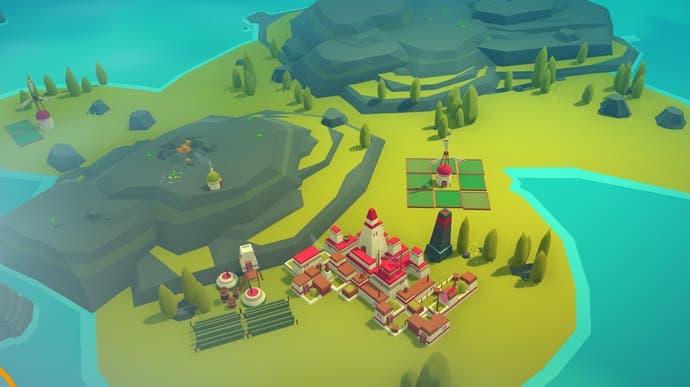Games that ask: what are cities?
From Pocket City to Sandcastles.
I've been playing and replaying a handful of games recently and I've started to realise that they're all the same game, or rather they all have the same preoccupations, even if they take things in different directions.
They're all city builders. Sort of. Really, I would say they're all games that look at cities and ask: what are they? What do cities do? What forces bring them together and define them? All these games have slightly different answers to these questions.
I've written about some of these games already, but I can't let them go. I love city builders. I love the idea of them anyway. But then I get bogged down, I lose track of the plumbing, I build my power station in the wrong place and everybody moves out because I haven't thought about the police or the fire department.
The first game I've been playing recently looks like a city builder of that kind, but, played on the easiest level, it's completely pared back. It's called Pocket City, it's for smartphones, and I've come to realise it's kind of like doodling - doodling with streets.

Pocket City uses roads to plumb in and wire all your buildings together. This means you don't have to think about any of that stuff much unless you really want to. As long as you're on a road, you're good to go. Taxation and public strategy and all that kind of thing are equally ignorable if you play on easy and you focus on expansion. The reason for this, I think, is that Pocket City wants you to get a sizable city up and running pretty quickly, because the game's take on cities lies with the idea that cities are what goes on there.
You're the mayor in Pocket City, and as always with these sorts of games you have to deal with natural disasters like volcanos and earthquakes and lightning storms. But you also have to deal with the quirks of the citizens. One of them wants an easy route to the mountains where they like to spend their weekends. Another wants you to track down a busker, or someone doing yoga, or a car-jacker. I spent a lot of time scanning the streets in Pocket City, playing a version of Where's Wally on a massive canvas I had helped to put together. As a result, I got to love the city I had made even as I realised how thin the simulation driving it is. That's kind of the point really. Pocket City says a big part of the appeal of a city is its surface, so why not get your nose right up against the surface and enjoy what you've built?
Mini Metro ditches the surface entirely. This is a game about running an underground system, but it's also a game about managing the negative space of a city. As you build your lines and connect the stations that appear one by one, you're mapping the unseen city itself, creating a sort of shadow image of the surface. (While I've been playing Mini Metro, I've been reading Robert Macfarlane's wonderful book Underland, about the worlds beneath our feet. It's been very harmonious.)
What does Mini Metro make of cities? It says that cities are like veins and arteries. Hardly a new insight, but the game explores this in an interesting way. Your underground stations come in different shapes, and your commuters come in different shapes too. Since your task is to keep the city growing without overwhelming any single station by having people stuck there for too long, Mini Metro encourages diversity. Those veins and arteries need to go everywhere, or rather they need to cover a wide range of different station shapes. The health of a city is in its scope and inclusivity. I think this is a huge part of what makes this abstract game feel so warm and human.

Next up is Islanders, which is such a preoccupation at the moment I may have to delete it so I can get on with my life. Islanders is a city builder in which everything revolves around placement. You work through packs of buildings - townhouses, different sorts of factories, religious structures - and you have to place them on the limited space you have in order to maximise the points you get from them. If you don't make enough points, it's game over. The way points are calculated is by the rules of each building. Every building has other buildings it likes to be near, and other buildings it absolutely hates to be near. This method of placement leads to cities that look far more organic than the cities that are generated by most other city builders. Not bad considering it's basically a civic version of the cafeteria scene from Mean Girls.
As I move each piece around and check the points that it could theoretically be receiving in each place, I'm reminded a little of the bidding process you get these days - the way that so many cities in the US put in bids to be the second site of Amazon's headquarters, for example. That's what those numbers scrolling past seem to mean: who wants this grain silo or this fountain more? I can't work out whether this makes Islanders a city-builder with a very contemporary outlook, or whether it says that there is nothing new under the sun. Either way, it's a unique take on the resource game: resources can repel as well as attract. (I told a friend of mine this, and he told me a story about always building his power plant in the center of town in Sim City because he liked to dice with accidental radiation leaks, so maybe it has a precedent in games after all.)
Finally I've been playing Triple Town and Sandcastles, the first by Spryfox, the second by Vectorpark. Both have been out for a while, I guess, but they remain fascinating and engrossing. Triple Town is sort of a match three affair, in which you evolve a patch of land by building new objects from old ones. Three turfs come together to make a bush. Three bushes make a tree. Three trees make a house. Three houses...

What I love about this is that it captures the sort of cumulative feel of human spaces. It captures the fact that things are always moving and changing, and that cities are as much about destruction and the removal of nature as they are about the creation of cathedrals and shopping districts. It makes for a beautiful partnership with Sandcastles, a gloriously simple, gloriously troubling toy in which you build sandcastles and then enjoy them until the tide comes in and washes them away. Cities, it argues, are impermanent. If you want to hear God laugh, as they say, tell Him your plans.
I say this is troubling, but Sandcastles makes it feel rather enlightening. Maybe it affords a change of perspective, nudging you gently out of your human mindset for a while. It's worth remembering, perched in the early years of the Anthropocene, that everything humans have made can be washed away. And once that's done - what next?

